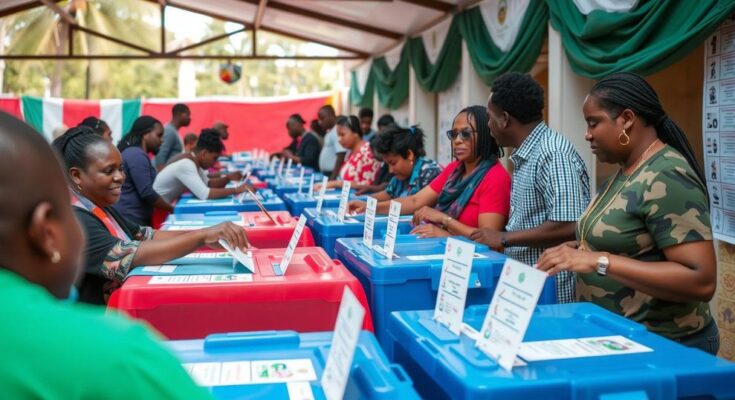Voters in Comoros are heading to the polls to elect a new 33-seat parliament. Approximately 338,000 individuals are registered to vote, following last year’s contentious election of President Azali Assoumani. Allegations of authoritarianism, irregularities in past elections, and potential dynastic succession are central topics in this election. Opposition parties are divided on participation, with some advocating for a boycott. Results are anticipated by Friday.
The citizens of Comoros are participating in parliamentary elections for the 33-seat legislature this Sunday. This election follows the contested re-election of President Azali Assoumani last year, which the opposition claims was tainted by significant irregularities—a charge that officials from Assoumani’s ruling party reject. Approximately 338,000 registered voters are anticipated to cast their ballots, with almost 100 candidates vying for a seat, as selected by the Supreme Court.
The previous parliamentary election occurred in January 2020. Assoumani, who has been in power since a coup in 1999, has been accused by his rivals of authoritarian practices and purportedly grooming his eldest son, Nour El-Fath, to succeed him after his term concludes in 2029. The president granted his son extensive powers in 2024 to oversee governmental functions, further intensifying concerns regarding succession.
Many opposition groups, including the Juwa party led by former President Ahmed Abdallah Sambi, who is currently imprisoned, have encouraged a boycott of the elections, yet some factions have chosen to participate. Hamidou Karihila, a candidate from the opposition Hope of the Comoros party, remarked, “The Azali regime is weakened … by participating in these elections we are contributing to further exposing the flaws in its system and accelerating its inevitable fall.” Election results are expected to be released by Friday.
Comoros, an archipelago located in the Indian Ocean, has a complex political landscape characterized by a history of coups and controversial elections. The country last held parliamentary elections in January 2020, marking a significant gap in electoral participation. President Azali Assoumani’s current administration, which began following a coup in 1999, has faced criticism for authoritarian governance and allegations of electoral malfeasance. The political climate has been further complicated by the recent appointment of Assoumani’s son to key governmental roles, raising questions about dynastic politics within the small nation.
In summary, the parliamentary elections in Comoros represent a crucial moment for the archipelago as it grapples with accusations of authoritarianism under President Assoumani’s leadership. The participation or boycott by opposition parties may significantly influence the political landscape. As citizens cast their votes with aspirations for change, the impending results will likely reflect the nation’s response to the current regime and its perceived legitimacy.
Original Source: www.moreechampion.com.au




